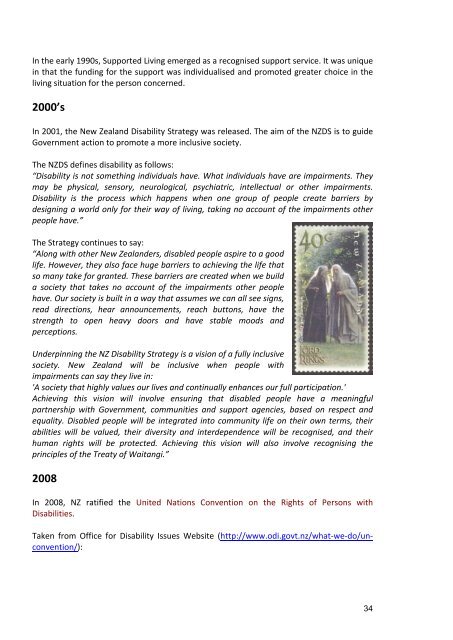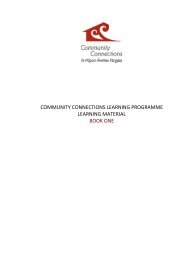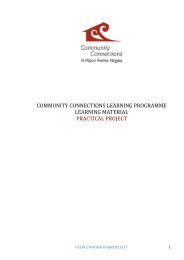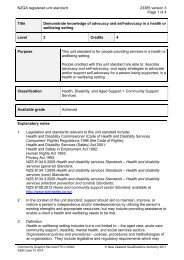BookOne
You also want an ePaper? Increase the reach of your titles
YUMPU automatically turns print PDFs into web optimized ePapers that Google loves.
In the early 1990s, Supported Living emerged as a recognised support service. It was unique <br />
in that the funding for the support was individualised and promoted greater choice in the <br />
living situation for the person concerned. <br />
2000’s <br />
In 2001, the New Zealand Disability Strategy was released. The aim of the NZDS is to guide <br />
Government action to promote a more inclusive society. <br />
The NZDS defines disability as follows: <br />
“Disability is not something individuals have. What individuals have are impairments. They <br />
may be physical, sensory, neurological, psychiatric, intellectual or other impairments. <br />
Disability is the process which happens when one group of people create barriers by <br />
designing a world only for their way of living, taking no account of the impairments other <br />
people have.” <br />
The Strategy continues to say: <br />
“Along with other New Zealanders, disabled people aspire to a good <br />
life. However, they also face huge barriers to achieving the life that <br />
so many take for granted. These barriers are created when we build <br />
a society that takes no account of the impairments other people <br />
have. Our society is built in a way that assumes we can all see signs, <br />
read directions, hear announcements, reach buttons, have the <br />
strength to open heavy doors and have stable moods and <br />
perceptions. <br />
Underpinning the NZ Disability Strategy is a vision of a fully inclusive <br />
society. New Zealand will be inclusive when people with <br />
impairments can say they live in: <br />
'A society that highly values our lives and continually enhances our full participation.' <br />
Achieving this vision will involve ensuring that disabled people have a meaningful <br />
partnership with Government, communities and support agencies, based on respect and <br />
equality. Disabled people will be integrated into community life on their own terms, their <br />
abilities will be valued, their diversity and interdependence will be recognised, and their <br />
human rights will be protected. Achieving this vision will also involve recognising the <br />
principles of the Treaty of Waitangi.” <br />
2008 <br />
In 2008, NZ ratified the United Nations Convention on the Rights of Persons with <br />
Disabilities. <br />
Taken from Office for Disability Issues Website (http://www.odi.govt.nz/what-‐we-‐do/un-convention/):<br />
<br />
34





